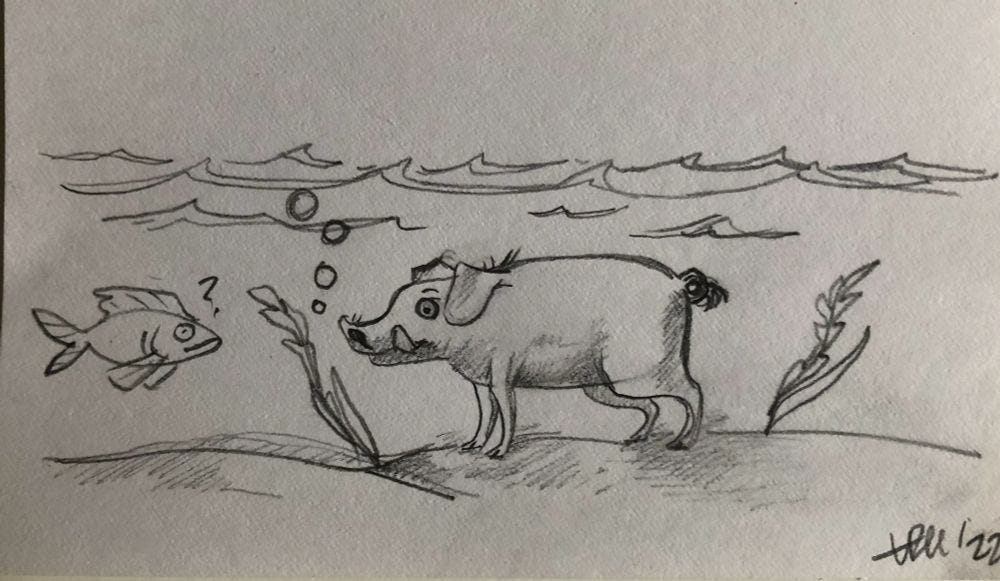Dear Friends,
When I think about my favorite books, some feel like they “make sense.”
Honestly, I don’t know what that means, but there’s a way in which I feel like it “makes sense” that I love the poetry of Adrienne Rich and Marge Piercy and Mark Strand. That I read every novel by Karen Russell. Even that I have a strange inclination toward Japanese literature in translation. But then, in the midst of all that, is Moby Dick.
I don’t know who I think is supposed to love Moby Dick, but I think that strange novel is a delight. I love the long dives into whaling practices. I took an incredible class dedicated to that book as an undergraduate, where every Americanist in our English department lectured on a different aspect of the novel. I follow a Moby Dick bot on Bluesky. I will, for one reason or another, always come back to Moby Dick.
It’s just good storytelling. And one way you can tell Moby Dick is good storytelling is by the epigraph to the final chapter, which cites a line from the Book of Job: “And I only am escaped alone to tell thee."
One Remains
“And I only am escaped alone to tell thee” operates as a refrain in Job. It’s what the messengers come to Job crying after each disaster befalls his household, said four times. Other texts, fiction and non-, may not narrate this position so directly, but we love a sole survivor story – the person pulled from the rubble, the sole survivor of the crash or the fire, the avalanche.
There are other ways to be the only one left, though. This is Elijah’s claim in this week’s Track 1 passage from 1 Kings; he stands before God, his face covered in awe and fear, and says to God, “I have been very zealous for the Lord, the God of hosts; for the Israelites have forsaken your covenant, thrown down your altars, and killed your prophets with the sword. I alone am left, and they are seeking my life, to take it away."
He’s the last prophet standing. He’s the last one left telling everyone the difficult truths of God, of righteousness and faith, and no one wants to hear it. I think we’ve all been there, trying to tell a hard truth to someone who doesn’t want to hear it. Job didn’t want to be told that his animals were dead, and certainly not that his children had perished. The people Elijah visited with and lived among did not want to hear that they weren’t worshipping or living correctly.
And then, in the Gospel, there is Legion.

The man who calls himself Legion is full of demons. So many demons he refers to himself by a collective title. And Jesus comes and casts them out. He disrupts everything – ruins the pig farmers’ livelihoods. But in the end, it is just that one man, whoever he was at its core, left behind.
Alone In Your Skin
When we present about the Spirituality of the Child in Godly Play, one of the key elements of that presentation touches on the existential limits that structure our experiences. And one of those limits is this: we are fundamentally alone. As we often say it, “even if you are a twin, no one else experiences the world exactly like you are. You are the only one inside your skin.”
This feeling can be particularly pressing during times of distress. We can feel so alone, so completely unable to make our experiences known to others. It can be the experience of serious illness or loss or unusual, painful family circumstances. And, I think, for many neurodivergent individuals – those with ADHD, autism, or various mental health conditions – it is our daily state. We look at the world that seems to happen around us and feel like we fundamentally don’t understand how any of it works, how other people make it through the day or make things happen. Sometimes it’s so small a thing as wondering how people manage to consistently keep the sink clear of dirty dishes or have the thought they need to call the dentist and simply pick up the phone and do so.
We alone are left to tell our stories. But this framing, the notion that this is a storytelling device, the declaration of the sole survivor, tells us something else: we are not meant to carry those stories alone. We are meant to tell them.
Storytelling Practice
The Gospel story of Legion, the man possessed by so many demons, offers us a chance to think about how we tell stories more generally. After all, this story is told to us as one of the ways the Bible testifies to Jesus’s extraordinary works. But it’s also an invitation to us to be storytellers of both our faith and our own lives. That being said, it can be easier to start with other stories, before we’re ready to be vulnerable. Some ways to do this:
Read the Gospel aloud. You might read it a few times to get a solid grasp on the story. Then tell the story as a group in a spontaneous oral fashion, using the phrase “And then…” to invite the next person. Each storyteller can choose to tell a piece of the story using whatever perspective they life: Jesus, the possessed man, a pig, a townsperson, a bird flying overhead – anyone. (We did this in worship at Province 1’s Forma gathering and it was great fun.
Create a comic strip-style telling of a story! I like to offer comic strip frames as a response material for older children in general - they’re a great storytelling tool for focusing on the distinct elements of a particular story, what’s most important, where the action or humor is.
Play 10 Word Story. In pairs or trios, tell tiny stories by each saying one word at a time, passing it around. You only get 10 words total, so you have to plan ahead, even though you don’t know what the other person is going to say.
MadLib It! If you’ve been around a while, you might know about my fondness for MadLibs (I had themed MadLibs at my wedding!). Take a Bible text, a storybook version of it, or just another favorite story, and pull out key words. What will you discover in that reshaped story?
Practicing storytelling is less about the stories themselves and more about experiencing our own voices, about being heard. We can’t tell the hard stories – the ones only we can tell – until we’ve built an easier foundation.
A Prayer
Heavenly Father, author of our lives, you wrote us into your greatest story. Be with us when it feels as though no one understands our story and give us the strength to tell out our experiences – in words, in images, in movement. Help us to know that even in our aloneness, in our unique existence, we are never truly alone, for you are with us. You hold our story in your hands and hear the cry of our hearts. All this we pray, in the name of the Creator, Redeemer, and Sustainer. Amen.
Resource Round-Up
Some quick summer season notes:
My friend Di, Keeper of the Good, of the Community Yelling space, of neighborhood Soup Nights, shared this newsletter, which includes A Contemplative Guide to Praying the News. The news is what I like to call “the bad place” but we do need to approach it, attend to it, to be good citizens. Praying with the news seems like the best of all options.
Most of us are entering our regrouping and planning season. Maybe you’re doing volunteer recruitment for the coming year or working on your calendar for the 2025-26 program year. Whatever you’re doing and whatever the scope of your work, I recommend looking at Sustainable Children’s Ministry by Mark DeVries and Annette Safstrom. While it can definitely be oriented towards churches much larger than those many of us are in, there are some really useful models in that text for thinking about our work. And don’t overlook the free resources available for download on the InterVarsity website. Even if you have to adjust for scale, these tools are so helpful for thinking about program structure.
I know I have a lot of Peace Table fans over here! If you’ve enjoyed that storybook Bible & Curriculum or it’s predecessor, Shine On, I encourage you to check out the options for becoming a Shine Everywhere Partner. There are a variety of options available for families and churches, allowing you to be part of broader faith conversations while trying new strategies.
No newsletter next week, when I’ll be off doing some of my own professional development work. But if you’re looking for training or other ways to support your programs in the coming year, drop by abirdinchurch.com and send me a note! I’ve got Godly Play trainings coming up, coaching services, and administrative support available, among other custom offerings. Let’s thrive together!
Peace,
Bird





